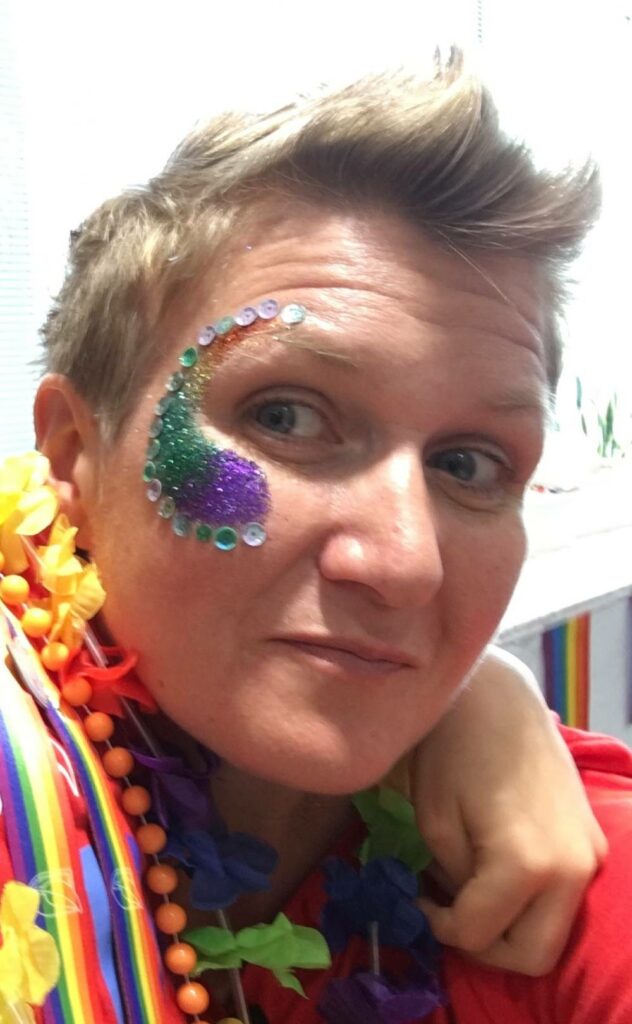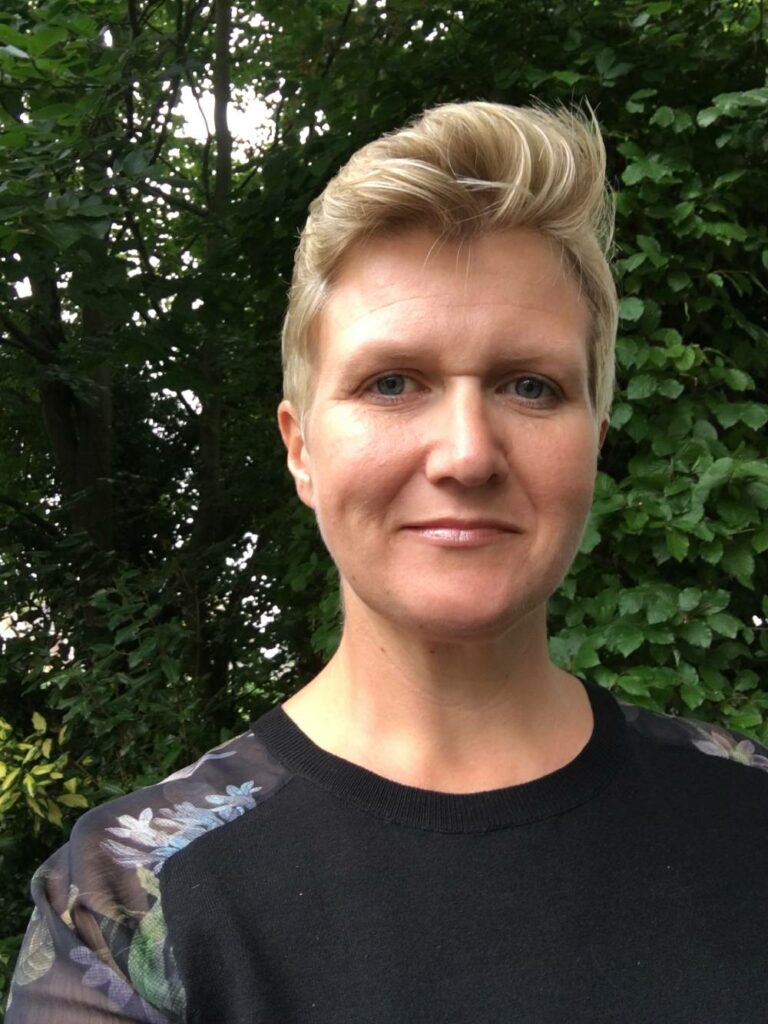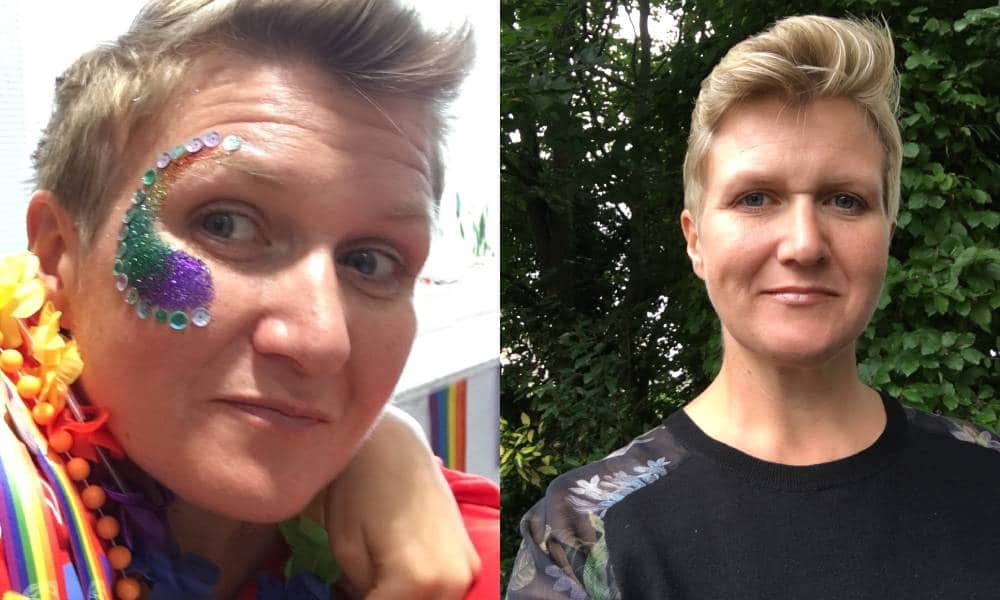Rebecca Dandridge, parent-of-two and director of public affairs for Gilead Sciences in the UK and Ireland, talks about coming out at work and how becoming a mother helped free her. (Provided)
Rebecca Dandridge, parent-of-two and director of public affairs for Gilead Sciences in the UK and Ireland, tells PinkNews about her journey of coming out at work and how becoming a mother helped free her.
Dandridge began her career as a theatre designer, moved into events management and now leads Gilead Sciences’ public affairs work on HIV in the UK and Ireland. She’s also a parent-of-two and a proud advocate for LGBT+ visibility at work, in schools and across our communities.
PinkNews spoke to Dandridge about starting a family, the value of diverse workplaces and why we’re not done yet with challenging inequality.
PinkNews: Can you start by telling us about your family and your working life?
Rebecca Dandridge: My wife and I have been together for 13 years. We had a conversation really early on in our relationship about having children – she definitely didn’t want to be pregnant, but we both wanted to be parents, so that made some decisions very easy. I would have the stretch marks and morning sickness and she would do the nappy changes!
We now live in the suburbs with our two daughters, aged six and nine, and we both work full-time. She’s a deputy headteacher. As with all working parents there is a lot to juggle but I’m fortunate to work in a company where they allow flexi-time, so I get to collect the children from school a couple of times a week. My role at Gilead, working on HIV and hepatitis, means I spend a lot of time working with patient communities to help tackle stigma and reduce health inequalities. I feel privileged to meet the most interesting, diverse and passionate people who dedicate their lives to supporting people who live with HIV.

How easy was it to come out at work and why is it important to you to be out in the workplace?
Before working in pharmaceuticals I worked in theatre design. Within the arts no one cared if I was gay. It was a huge change from the small seaside town where I grew up. Then I had a change in career and started a four-week contract as an events manager within a pharmaceutical company where I ended up staying for 12 years. As soon as I joined, I felt I needed to go back into the closet to those outside of my team. I couldn’t see anyone like me, especially in leadership – no one gay, no one arty, it felt like it was all suits and ties.
When I told my boss that I was having IVF, she was amazing – I had the time off I needed and she was so supportive throughout the process. It was at four weeks pregnant that I had the moment of: ‘How can I bring children up to be confident and proud of themselves and our family if I’m not being 100 per cent myself at work?’ The following day I came out to everyone, even the barista in the coffee shop. I would drop into every conversation that I was gay and married, I’d talk about my wife within the first minute of meeting a new person, I didn’t give anyone the chance to assume anything else. Later, when I would tell people I was pregnant, there were a lot of questions, often from people I didn’t know very well. There was a line, but I rarely turned down a question. I believe openness creates honesty, and I am happy to educate.
Has becoming a parent changed your attitude to work?
Absolutely. I realised that I had been carrying around a lot of fear for a long time. Fear of homophobia, fear of limiting my career, fear of being totally myself at work. That fear was holding me back. When I did come out to people at work, 99 per cent of responses were positive. I was more confident, more visible, more genuine and my career soared.
I joined Gilead because of its work in HIV and its ethos of inclusion and diversity. Gilead talks about “differences creating innovation” – I really see that now. The way of seeing the world differently that I bring as a gay woman with children, and my colleagues bring for different reasons, benefits us all.
What advice would you give to an LGBT+ person just starting out on their career?
Do your research. Make sure the company where you are applying lives what they say about diversity and inclusion. Having it hidden in a policy is not enough. Look them up on LinkedIn, connect with current employees, make sure that they are internally and externally demonstrating commitment and creating a safe working environment for the LGBTQ+ community.
In my Gilead interview they asked whether I was open-minded because it was necessary for the role. It’s an attitude that Gilead really lives by and it made me want to work here.

You co-lead Gilead’s Pride Alliance employee resource group, why did you take on that role and what difference do you feel the group makes?
At first, I thought I was too busy, especially with juggling work and parenthood, but it was something I felt that I had to do. There are still challenges in the UK and in some countries LGBTQ+ rights are alarmingly and rapidly going backwards. I feel that I – and as part of a company, we – have a responsibility to advocate for change.
An Australian colleague and I oversee the network in Australia, Canada and Europe and there are leads in each individual country. We want to normalise LGBTQ+ inclusion across the organisation, driving internal awareness by bringing people together to understand the importance of things like Pride. It’s about creating a safe space, especially in more conservative countries. We’re also active externally. We want prospective employees to know that this is a place where you can be yourself.
What are your hopes for your children, and how are you, as an LGBT+ parent, helping drive acceptance and inclusion?
Most of all, I want my children to be happy, confident and accepted. But that’s only possible if we are out there, flying the flag.
Recently, my oldest told us that she didn’t tell a new classmate at school that she has two mums. My daughter doesn’t want to be different at nine; she wants to fit in. But it’s not just about my wife and I building her confidence and resilience, it also falls to the community around her to normalise LGBTQ parenting so she does see her family reflected back at her. We all need to reflect differences every day in the conversations we have. It’s not just for LGBT History Month or around Pride. If we don’t say anything, then things will never change. I’d love any LGBTQ+ friends that my children may have to look at our family, and think, oh wow, it’s totally possible, I can be myself, I can be successful and I can have a family.
